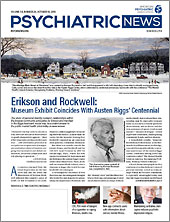More than half of adults with schizophrenia have impaired sexual interest, an analysis in Psychiatric Services in Advance suggests. The analysis also revealed that sexual self-efficacy—the belief that one is able to have enjoyable sex with a partner—plays a key role in whether patients in this population are interested in sexual relationships.
Researchers at Dartmouth Medical School used data from three studies to examine the relationships among sexual interest, demographic characteristics such as gender and age, and clinical factors such as symptoms and medications. The studies included 231 adults aged 21 years or older who had schizophrenia or schizoaffective disorder and had at least moderate impairment in areas such as self-care or social, community, or occupational functioning.
To assess sexual interest, the researchers looked at the participants’ responses to an item from the Scale to Assess Negative Symptoms; to gauge sexual self-efficacy, they looked at how participants rated their level of confidence on a single item from the Revised Self-Efficacy Scale.
Sexual interest was very low in 46% of the participants, mildly to moderately impaired in 14%, and unimpaired in 40%. The higher participants rated their sexual self-efficacy, the less likely they were to have impaired sexual interest. In general, men had significantly higher levels of both sexual self-efficacy and sexual interest than women. The researchers wrote that the gender difference may stem from societal stigma regarding female sexuality, which discourages women from admitting to sexual interest or from higher rates of sexual abuse among women, which may prompt them to avoid sexual relationships.
Marital status, symptom severity, the presence of negative symptoms such as low emotional expression, and treatment with medications that carry a high risk of sexual dysfunction did not appear to affect level of sexual interest. The researchers wrote that their findings highlight the need for interventions to address sexuality among people with schizophrenia.
“An intervention that teaches people the skills needed to successfully pursue and navigate intimate relationships could positively affect confidence and ultimately lead to improvement in medication adherence and overall quality of life,” they wrote.
The challenge is that many health professionals are hesitant to discuss sexuality with patients in this population, said lead author Cynthia L. Bianco, M.S. Bianco, an associate research coordinator at Dartmouth-Hitchcock Medical Center, conducted the preliminary analysis that led to this study.
“When doing literature reviews, I found articles in which surveys showed that people with schizophrenia want to talk about sexual relationships. They are interested in these relationships, but no one brings it up, so they suffer in silence,” Bianco told Psychiatric News.
“[Health professionals] should put this in the context of their own lives,” Bianco added. “How would they feel if they suffered with sexual dysfunction or low sexual interest, and it was swept under the rug?”
Although the study did not show an association between medications and participants’ sexual interest, researcher Sarah Pratt, Ph.D., an assistant professor of psychiatry at the Geisel School of Medicine at Dartmouth, believes that psychiatrists should have thorough discussions with their patients about the potential sexual side effects of medications.
“Historically, patients don’t get a lot of information about this. They take the medications, they get side effects, and they say, ‘I didn’t know that was going to happen,’ ” Pratt said. She added that psychiatrists and other physicians shouldn’t shy away from offering other treatments, even if their patients are otherwise stable, because patients who attribute their sexual dysfunction or loss of sexual interest to side effects are more likely to stop taking their medications.
This study was supported by the National Institutes of Health and the Centers for Disease Control and Prevention. ■
“Deficits in Sexual Interest Among Adults With Schizophrenia: Another Look at an Old Problem” is posted
here.


